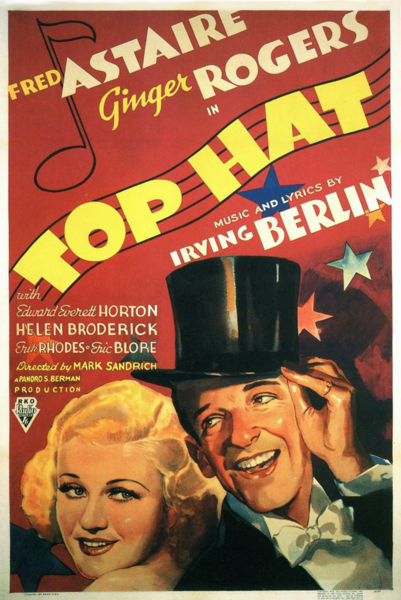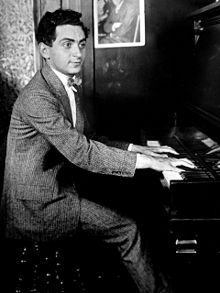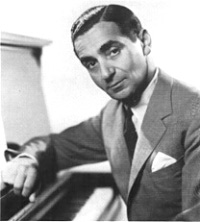This week, Riverwalk Jazz celebrates Irving Berlin's classic songs from Hollywood musicals in the 1930s, 40s and 50s in A Night at the Movies with Irving Berlin.
Irving Berlin lived for more than 100 years and amassed a catalog of over 1000 songs. Jerome Kern said about him, "Irving Berlin has no place in American music -- he is American music."
Our special guest vocalist this week is Rebecca Kilgore, an accomplished jazz musician and a favorite with Riverwalk audiences.
Irving Berlin said, "You write in the morning, you write at night. You write in a taxi, in the bathtub, or in an elevator. And after the song is all finished it may turn out to be very bad, but you sharpen your pencil and try again. A professional songwriter has his mind on his job all the time."

Poster for the 1937 film Top Hat. Courtesy songbook1.wordpress.
Berlin was equally at home writing for Broadway and Hollywood. He wrote seventeen complete scores for Broadway musicals and revues, and contributed material to six more. Among the classic Hollywood movie musicals with scores by Irving Berlin are Top Hat, Follow The Fleet, On the Avenue, Alexander's Ragtime Band, Holiday Inn, This is the Army, Blue Skies, Easter Parade, White Christmas and There's No Business Like Show Business.
Irving Berlin was a man of opposites. He was a musical genius and a savvy businessman. Berlin's motto was "give the people what they want to hear." He had an uncanny ability to know what that was, and was able to change with the times as the years rolled by and keep up with changes in American taste and style. He was "Mr. America," capturing the spirit of the country in songs like "Easter Parade" and "God Bless America."
But he was also a Russian-born Jewish refugee. Growing up on the Lower East Side of Manhattan he slept on the fire escape in a three-room apartment he shared with eight other family members. These pictures of his early life are a stark contrast to the images in the songs he created for the movies.

Berlin at his first job with a music publisher, age 18. Courtesy wikimedia.
The very first widely-viewed motion picture with sound was a musical called The Jazz Singer. It featured "Blue Skies," a popular song that Irving Berlin had written earlier for a Broadway show. It was 1927 and Berlin had already been writing America's popular music for two decades. By 1929, like everyone else who'd been writing songs for Broadway and Tin Pan Alley, Irving Berlin had moved out to Los Angeles.
Never a "team player," Berlin had many misgivings about living and working in Hollywood, but he soon found opportunities to be in control of much of the creative process.
The 1929 market crash gave Berlin his first idea for a movie script, a musical about a Wall Street banker. Douglas Fairbanks would play the lead, and newcomer Bing Crosby had a bit part.
For the moment Irving Berlin was back where he always wanted to be—in the driver's seat. By the mid-1930s Berlin was creating movie scenarios and producing the music for at least one musical a year. His songs were sung by Fred Astaire, Al Jolson, Judy Garland, Bing Crosby, Dick Powell, Alice Faye and many others.
Photo credit for Home Page: Irving Berlin, 1927. Photo courtesy filmreference.
Text based on Riverwalk Jazz script by Margaret Moos Pick ©2005



